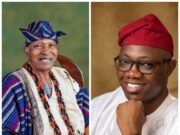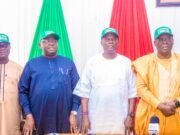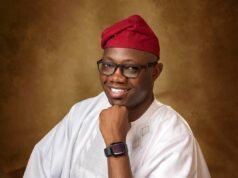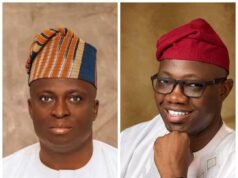Negotiation is often described as nothing more than communication with results. With it, war can be averted, divorce avoided, and political crisis, prevented. Where negotiation fails, the outcome is usually and always brutal and catastrophic. As a matter of fact, nothing binds the seemingly fragile and unpredictable world together than negotiation. Described as crucially inevitable tool, negotiation, when handled carefully and skillfully is significant to maintaining and sustaining peace in relationship, business, politics and other human endeavors.
Perhaps, nowhere is negotiation more potent and useful than in the complex and complicated world of politics. Where compromise and concession are keys to getting things done, negotiation as Chris Voss described it is the unmistakable, undeniable masterstroke, simply the undisputable heart of collaboration. In essence, conflict, which is precursor to negotiation, becomes potentially meaningful and fruitful where all parties involved appear seen and heard. But clearly and utterly impossible to be seen and heard where one party, apparently the one with the edge, shut off the other. And nowhere is this stifling and counterproductive behavior more prevalent and rampant than in the exciting yet chaotic world of politics.
In Nigeria, telltales of failed political negotiations abound. Down the memory lane, the various unproductive attempts by different opposition parties prior to the 2015 election have more to do with failed negotiation than anything else. Pointedly, the experience of the first Republic appears different going by the dexterous ability of Sir Ahmadu Bello’s NPC and Dr. Nnamdi Azikwe’s NCNC to forge political relationship between the North and the East; an arrangement that enabled them to superintend over Nigeria at its formative stage. In addition, that political collaboration made the respected leaders ruled the country for six years before Democracy was bloodily thwarted thus paving the way for the successive military rules that permeated much of the country’s political trajectory. In a way, the inability of the late Sage Chief Obafemi Awolowo to engineer a formidable alliance with major political parties both in the first and second republics at the centre made much of his Democratic socialism an exercise in ideological tinkering.
More than any other factors, the persuasive ability and negotiating dexterity of Governor Seyi Makinde to assemble major opposition figures despite their different political affiliations under same roof in 2019 obviously played a pivotal role in his electoral victory. Stylishly, the administration of Governor Seyi Makinde rode to power in part because it successfully convinced opposition leaders to back it against other contenders. With that agreement and arrangement and despite the overt and covert support of the governments both at the centre and in the state, Governor Makinde was able to muster and garnered enough political supports that enabled him to pummel his major opponent by wide margin.
Not done yet, Makinde’s choice of running at that epochal election was in fact the bye product of a brilliant, illuminating and productive negotiation. Recall the then preferred deputy governorship candidate was visibly present on the political arena – contesting as a gubernatorial aspirant under the weakly African Democratic Congress (ADC) after decamping from the All Progressives Congress (APC). In effect, the careful consideration into the list of potential deputy governorship candidates by Governor Seyi Makinde’s camp gave Engineer Raufu Olaniyan an edge, widely considered the right peg in the right hole. Fittingly, his pedigree and deep pocket notwithstanding gingerly stood him out among the rest.
Unfortunately, the continuous bitter and fight-to-the finish face-off between Governor Seyi Makinde and his deputy seem to be taking another dangerous dimension. Perhaps, Oyo state seems the only state in Nigeria where the number one and number two citizens are on each other’s throats – dragging each other through the mud, media, in the assembly chamber, and now in the courtroom. No other state in the country appears to be teetering towards that precipice than the pace setter state. As much as the duo want to force their alternative realities down the throats of unsuspecting members of the public, media reports evidenced in cold and frosty relationship between them appear more telling and instructive. Curiously, one is tempted to ask one single calibrated question on this critical subject matter: at what time did negotiation become an instrument banished to the backseat? In the insightful words of Steve Gates, negotiating agreements is not about competing and winning; it is about searching the best value; which means understanding what the other person or party wants; what they do and how that affects the possibilities.
Evidently, the combined energy and synergy that should have been clearly channeled to help improve the lots of impoverished Oyo people are now been wasted on avoidable and reconcilable differences – alongside scarce resources. Naturally, conflict between two parties is obviously inevitable in all relationship. As a matter of fact, conflicts aren’t the problem, the problem is how differences are solved and agreements formed based on mutually acceptable terms. In this case, it appears all avenues toward conflict resolution between the two leaders are permanently shut leading to unnecessary charged political atmosphere.
Admittedly, the disagreement between the Governor and the deputy opens far more window into the inner recesses of the hearts and minds of those helping them decide on politics and policy framework. As the notorious Florence diplomat Nicholo Machiavelli declared: the quality of a leader is known through the caliber of people around him. Where a leader is surrounded and supported by smart and skilled negotiator, the result is one where all parties agree on mutually beneficial and acceptable terms. But where the reverse is the case, the result is always one of pandemonium, chaos and unrest.
Hopefully, before this personal feuds disintegrate into more catastrophic spat, both the Governor and his embattled deputy would bravely and courageously walk toward the crucible path of negotiation and arrive at a junction where peace is allowed to reign across board.
OYO101 is Muftau Gbadegesin’s Opinion about Issues affecting Oyo state, published on Saturdays. He can be reached via muftaugbadegesin@gmail.com and 09065176850



































